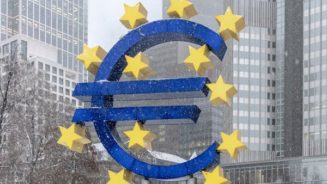“If you think about Brexit, that was supposed to be a very bad thing. Investors sold the market but came back quickly,” Ellinger said at a recent media event in Hong Kong..
“That’s the kind of environment we are going to be dealing with in 2017 as it relates to European political events.”
Ellinger, who is also the firm’s head of fixed income for North Asia, said Asian investors, including institutional and wealth management firms, have expressed concerns over Europe during his few days stay in Hong Kong.
This came as there have been clear outflows from European high yield products by investors worldwide as key elections approach and analysts questioned whether the euro currency or even the union itself can remain intact.
In 2016, for example, the UBS European High Yield Bond Fund had net outflows of nearly $2bn from global investors, according to Morningstar data. As of end-December, the fund’s size was around $3.5bn.
A Hong Kong-based UBS AM spokeswoman said that the outflows have been a general trend in European high yield funds over the past two years.
Low defaults
Ellinger said two main reasons European high yield is attractive are economic growth and a low default rate.
“And the longer we’re in this lower negative yield environment, high yield is going to look more attractive,” Ellinger added.
Economic growth in Europe is driven by an accommodative European Central Bank and by corporate earnings improvement.
The EU’s GDP is 1.8%, steadily rising after negative growth rates of 4.4 in 2009 and 0.5 in 2011, according to data from Eurostat.
An expected low default rate in Europe is also encouraging, he said.
“Default rates are expected to be low and we have an opinion that default rates will be lower than consensus,” he said.
Echoing Ellinger, a study by Euler Hermes shows that the expected rates of change in insolvencies for Western and Central Europe are the lowest in the world.
|
Region |
2016 change estimate |
2017 change forecast |
|
Western Europe |
-5% |
-4% |
|
Central & Eastern Europe |
-2% |
-1% |
|
North America |
0% |
1% |
|
Asia-Pacific |
5% |
6% |
|
Africa & Middle East |
16% |
9% |
|
Latin America |
18% |
12% |
Source: Euler Hermes
Financial sector preferred
In terms of sectors, Ellinger likes the European banking industry.
“The banking industry is improving, it is better capitalised, [but] it is certainly not an earnings story at this stage,” he said.
He also likes the broader or diversified finance companies, such as insurance firms in Europe, which should benefit from the rise of interest rates in the US.
On the flipside, he does not like retail companies given the rise of e-commerce and Internet shopping. “We don’t see retail in general doing very well in high yield,” he said.
He also does not favour energy at the moment as there is still a lot of volatility in commodity prices.
“They are still susceptible to volatility, so that’s something we are cautious of,” he said.
The three-year performance (to 31 December 2016) of the UBS Euro High Yield fund versus its benchmark. Both were hit by the Brexit vote in June but like all sectors and markets, recovered quickly.






